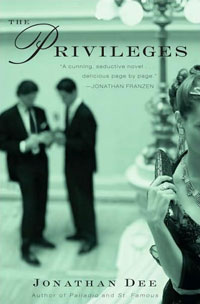What Does Money Say When It Talks?

When I first became acquainted with Jonathan Dee back in the mid-’90s, he had two decent novels under his belt—A Lover of History, The Liberty Campaign—and he was a wisecracking senior editor at the Paris Review, educated at Yale and seemingly destined to write smart “well-crafted” novels. With The Privileges, Dee is on his fifth opus, and in a few words it is the kind of novel I prophesied that he would produce.
Dee is to be credited with writing a story by whose particulars I am normally repelled and doing it so well that The Privileges became a compelling read. Set in Manhattan, Adam and Courtney marry in their early twenties, have two Ralph-Lauren-catalogue-model-looking children, and continue to trade up and profit in the high-rent zone of the city as Adam accumulates wealth in the private equity world and career-less Courtney does the predictable pro-bono dance, sitting on various charitable boards.
Here’s Courtney:
You could stay home and write checks, of course, and when Adam stared making serious money that’s all she initially thought to do; but a big check was wasted on these halfwit dowagers with no idea how to do anything more substantial then send out invitations to a benefit, and before you knew it you were involved… She did have a rule about staying away from disease charities; there was something about them that just struck her as especially haughty, a blithe tossing of money at the ineffable, like Won’t You Please Join Us in The Fight Against Death. She knew on some level that she was wrong about this but obeyed the feeling anyway.
And Adam (musing at a $1000-a-head gala):
Another Wall Street tyke… Another kid blowing his bonus money on a party where he thinks he’ll network with people that don’t even know he is alive. The whole bonus thing got to him actually, in a way it hadn’t before. He’d been given a big bonus this year, what did that even mean? Maybe he should buy himself a sailboat, or find more expensive hotels to stay in during the few weeks a year he was allowed to travel… or see if he could find an even more overpriced school to send his kids to? He felt like a sap. Everybody acted like the amount mattered, when what mattered was getting a bonus at all. Of bring outside the small circle wherein it was decided how much a man’s work was worth.
Elizabeth Strout’s blurb sums it up well:
The Privileges
